Analysis of Leadership and Management in Aldi Operations (Report)
VerifiedAdded on 2020/10/22
|17
|5735
|281
Report
AI Summary
This report examines leadership and management practices within Aldi, a major supermarket chain. It begins by defining and comparing the roles and characteristics of leaders and managers, differentiating between them using various leadership theories such as transformational and classical management theories. The report then explores how these roles apply in different business situations, such as technical advancements and market expansion, and analyzes the strengths and weaknesses of different leadership approaches, including situational, system, and contingency leadership. The report further delves into key approaches to operations management and how leaders and managers can improve operational efficiencies to meet business objectives, emphasizing the importance of operations management. Finally, it addresses factors within the business environment that impact operational management and decision-making by leaders and managers. The report concludes with a summary of the key findings and insights into effective leadership and management within a real-world business context.
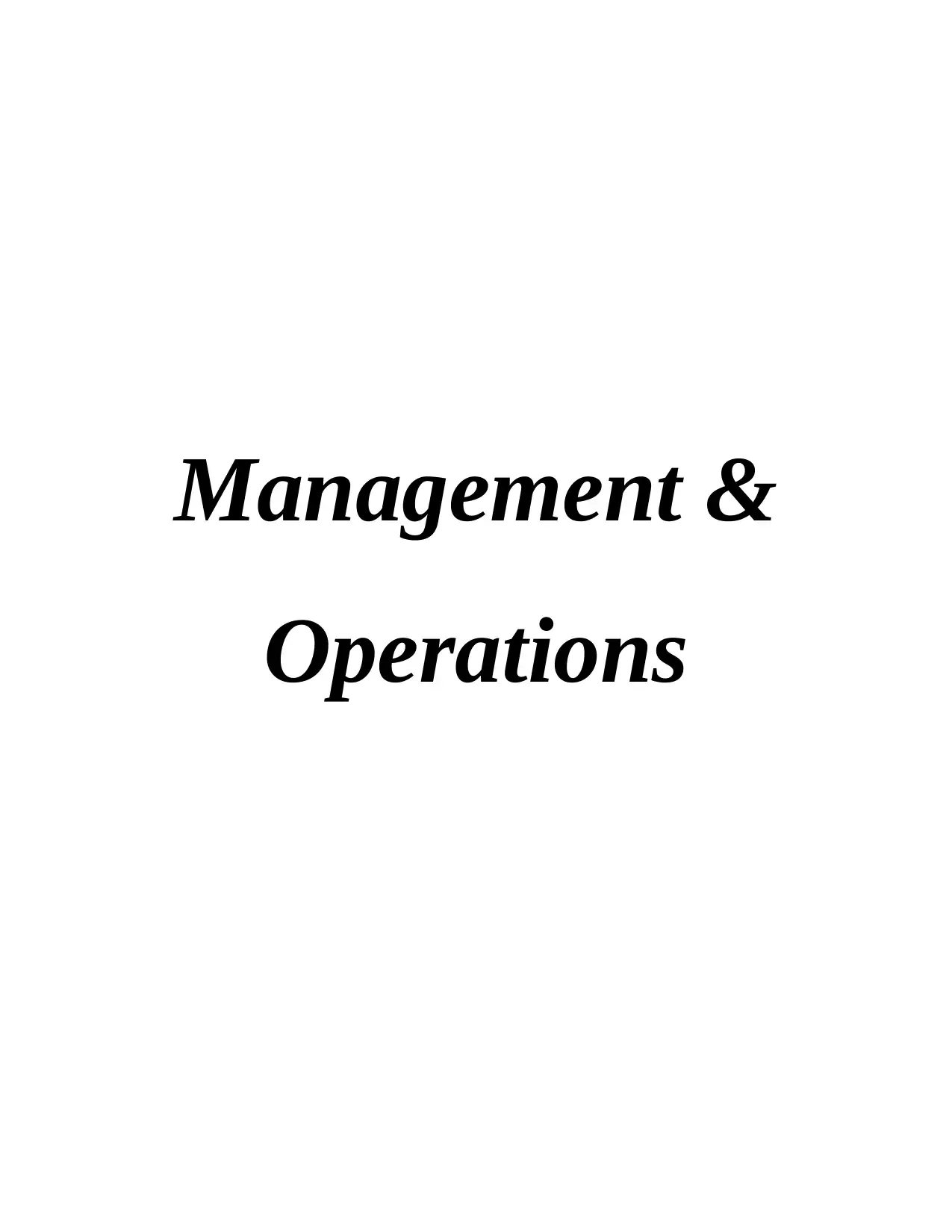
Management &
Operations
Operations
Paraphrase This Document
Need a fresh take? Get an instant paraphrase of this document with our AI Paraphraser
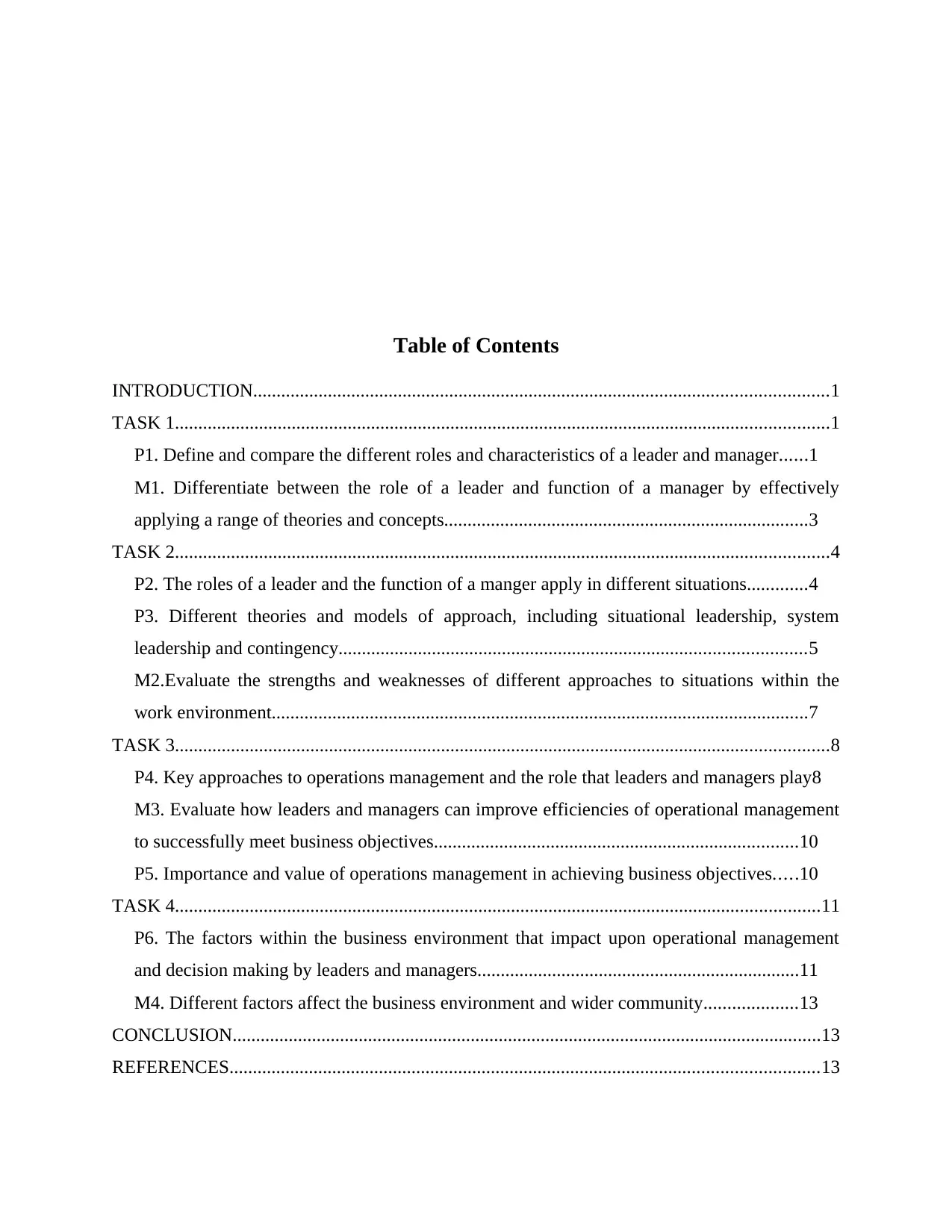
Table of Contents
INTRODUCTION...........................................................................................................................1
TASK 1............................................................................................................................................1
P1. Define and compare the different roles and characteristics of a leader and manager......1
M1. Differentiate between the role of a leader and function of a manager by effectively
applying a range of theories and concepts..............................................................................3
TASK 2............................................................................................................................................4
P2. The roles of a leader and the function of a manger apply in different situations.............4
P3. Different theories and models of approach, including situational leadership, system
leadership and contingency....................................................................................................5
M2.Evaluate the strengths and weaknesses of different approaches to situations within the
work environment...................................................................................................................7
TASK 3............................................................................................................................................8
P4. Key approaches to operations management and the role that leaders and managers play8
M3. Evaluate how leaders and managers can improve efficiencies of operational management
to successfully meet business objectives..............................................................................10
P5. Importance and value of operations management in achieving business objectives.....10
TASK 4..........................................................................................................................................11
P6. The factors within the business environment that impact upon operational management
and decision making by leaders and managers.....................................................................11
M4. Different factors affect the business environment and wider community....................13
CONCLUSION..............................................................................................................................13
REFERENCES..............................................................................................................................13
INTRODUCTION...........................................................................................................................1
TASK 1............................................................................................................................................1
P1. Define and compare the different roles and characteristics of a leader and manager......1
M1. Differentiate between the role of a leader and function of a manager by effectively
applying a range of theories and concepts..............................................................................3
TASK 2............................................................................................................................................4
P2. The roles of a leader and the function of a manger apply in different situations.............4
P3. Different theories and models of approach, including situational leadership, system
leadership and contingency....................................................................................................5
M2.Evaluate the strengths and weaknesses of different approaches to situations within the
work environment...................................................................................................................7
TASK 3............................................................................................................................................8
P4. Key approaches to operations management and the role that leaders and managers play8
M3. Evaluate how leaders and managers can improve efficiencies of operational management
to successfully meet business objectives..............................................................................10
P5. Importance and value of operations management in achieving business objectives.....10
TASK 4..........................................................................................................................................11
P6. The factors within the business environment that impact upon operational management
and decision making by leaders and managers.....................................................................11
M4. Different factors affect the business environment and wider community....................13
CONCLUSION..............................................................................................................................13
REFERENCES..............................................................................................................................13

⊘ This is a preview!⊘
Do you want full access?
Subscribe today to unlock all pages.

Trusted by 1+ million students worldwide
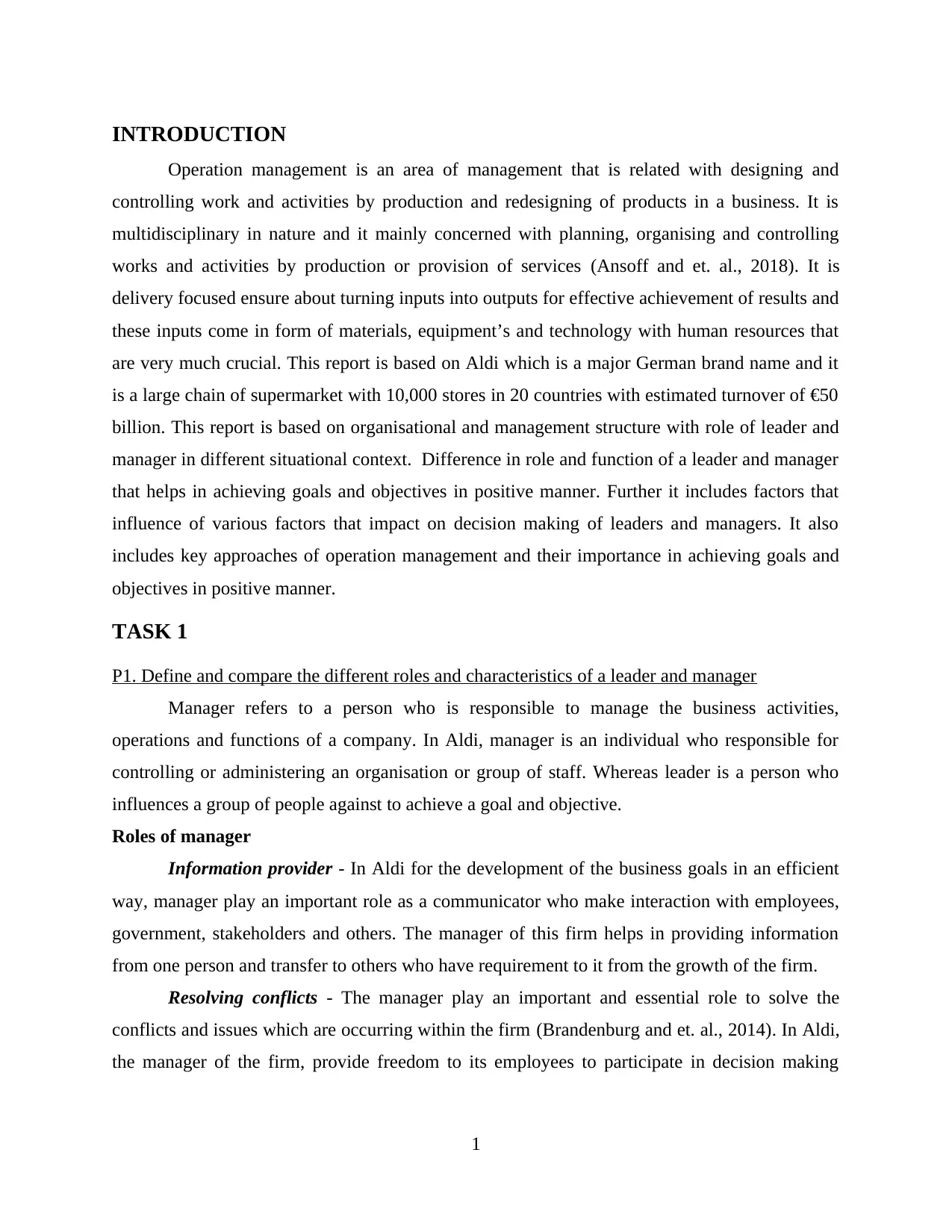
INTRODUCTION
Operation management is an area of management that is related with designing and
controlling work and activities by production and redesigning of products in a business. It is
multidisciplinary in nature and it mainly concerned with planning, organising and controlling
works and activities by production or provision of services (Ansoff and et. al., 2018). It is
delivery focused ensure about turning inputs into outputs for effective achievement of results and
these inputs come in form of materials, equipment’s and technology with human resources that
are very much crucial. This report is based on Aldi which is a major German brand name and it
is a large chain of supermarket with 10,000 stores in 20 countries with estimated turnover of €50
billion. This report is based on organisational and management structure with role of leader and
manager in different situational context. Difference in role and function of a leader and manager
that helps in achieving goals and objectives in positive manner. Further it includes factors that
influence of various factors that impact on decision making of leaders and managers. It also
includes key approaches of operation management and their importance in achieving goals and
objectives in positive manner.
TASK 1
P1. Define and compare the different roles and characteristics of a leader and manager
Manager refers to a person who is responsible to manage the business activities,
operations and functions of a company. In Aldi, manager is an individual who responsible for
controlling or administering an organisation or group of staff. Whereas leader is a person who
influences a group of people against to achieve a goal and objective.
Roles of manager
Information provider - In Aldi for the development of the business goals in an efficient
way, manager play an important role as a communicator who make interaction with employees,
government, stakeholders and others. The manager of this firm helps in providing information
from one person and transfer to others who have requirement to it from the growth of the firm.
Resolving conflicts - The manager play an important and essential role to solve the
conflicts and issues which are occurring within the firm (Brandenburg and et. al., 2014). In Aldi,
the manager of the firm, provide freedom to its employees to participate in decision making
1
Operation management is an area of management that is related with designing and
controlling work and activities by production and redesigning of products in a business. It is
multidisciplinary in nature and it mainly concerned with planning, organising and controlling
works and activities by production or provision of services (Ansoff and et. al., 2018). It is
delivery focused ensure about turning inputs into outputs for effective achievement of results and
these inputs come in form of materials, equipment’s and technology with human resources that
are very much crucial. This report is based on Aldi which is a major German brand name and it
is a large chain of supermarket with 10,000 stores in 20 countries with estimated turnover of €50
billion. This report is based on organisational and management structure with role of leader and
manager in different situational context. Difference in role and function of a leader and manager
that helps in achieving goals and objectives in positive manner. Further it includes factors that
influence of various factors that impact on decision making of leaders and managers. It also
includes key approaches of operation management and their importance in achieving goals and
objectives in positive manner.
TASK 1
P1. Define and compare the different roles and characteristics of a leader and manager
Manager refers to a person who is responsible to manage the business activities,
operations and functions of a company. In Aldi, manager is an individual who responsible for
controlling or administering an organisation or group of staff. Whereas leader is a person who
influences a group of people against to achieve a goal and objective.
Roles of manager
Information provider - In Aldi for the development of the business goals in an efficient
way, manager play an important role as a communicator who make interaction with employees,
government, stakeholders and others. The manager of this firm helps in providing information
from one person and transfer to others who have requirement to it from the growth of the firm.
Resolving conflicts - The manager play an important and essential role to solve the
conflicts and issues which are occurring within the firm (Brandenburg and et. al., 2014). In Aldi,
the manager of the firm, provide freedom to its employees to participate in decision making
1
Paraphrase This Document
Need a fresh take? Get an instant paraphrase of this document with our AI Paraphraser
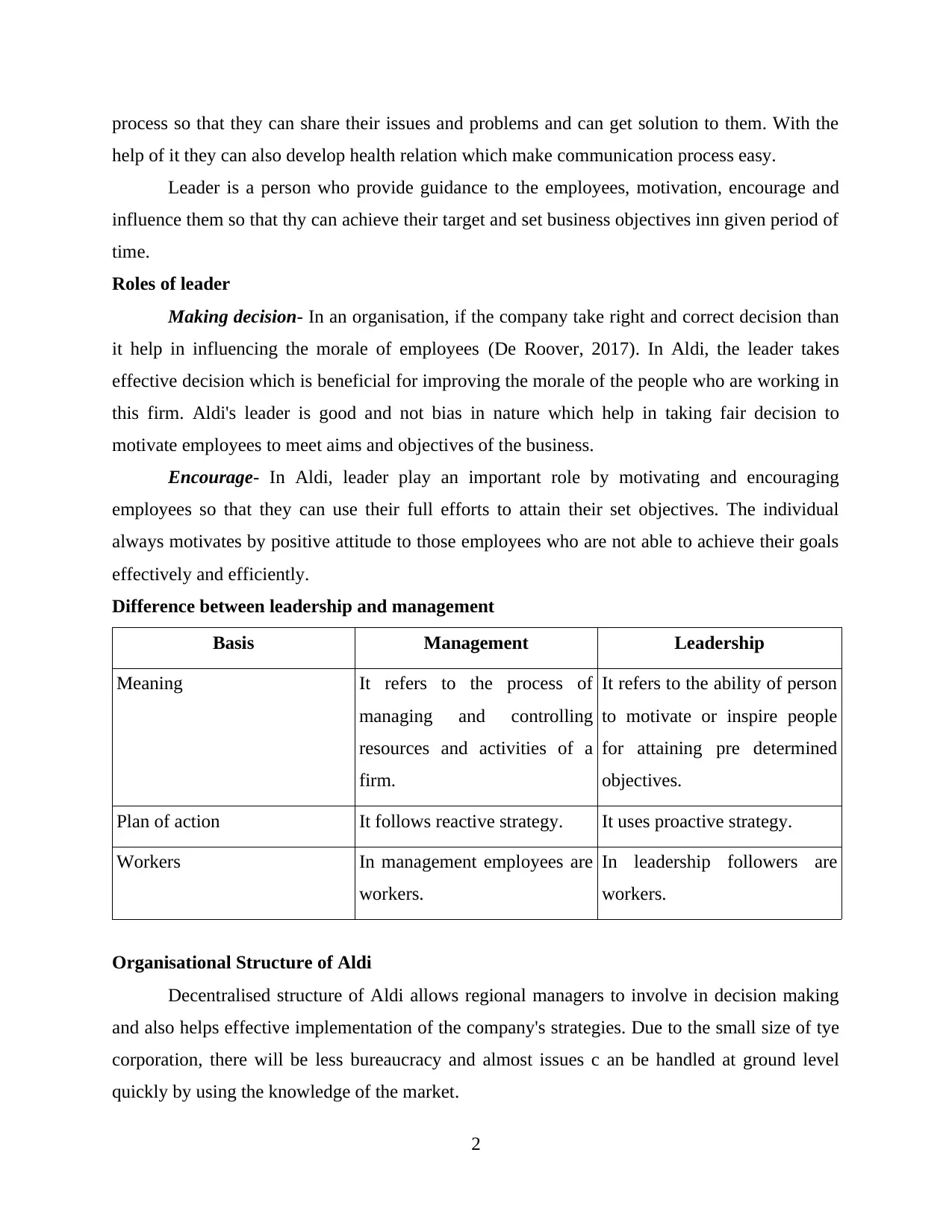
process so that they can share their issues and problems and can get solution to them. With the
help of it they can also develop health relation which make communication process easy.
Leader is a person who provide guidance to the employees, motivation, encourage and
influence them so that thy can achieve their target and set business objectives inn given period of
time.
Roles of leader
Making decision- In an organisation, if the company take right and correct decision than
it help in influencing the morale of employees (De Roover, 2017). In Aldi, the leader takes
effective decision which is beneficial for improving the morale of the people who are working in
this firm. Aldi's leader is good and not bias in nature which help in taking fair decision to
motivate employees to meet aims and objectives of the business.
Encourage- In Aldi, leader play an important role by motivating and encouraging
employees so that they can use their full efforts to attain their set objectives. The individual
always motivates by positive attitude to those employees who are not able to achieve their goals
effectively and efficiently.
Difference between leadership and management
Basis Management Leadership
Meaning It refers to the process of
managing and controlling
resources and activities of a
firm.
It refers to the ability of person
to motivate or inspire people
for attaining pre determined
objectives.
Plan of action It follows reactive strategy. It uses proactive strategy.
Workers In management employees are
workers.
In leadership followers are
workers.
Organisational Structure of Aldi
Decentralised structure of Aldi allows regional managers to involve in decision making
and also helps effective implementation of the company's strategies. Due to the small size of tye
corporation, there will be less bureaucracy and almost issues c an be handled at ground level
quickly by using the knowledge of the market.
2
help of it they can also develop health relation which make communication process easy.
Leader is a person who provide guidance to the employees, motivation, encourage and
influence them so that thy can achieve their target and set business objectives inn given period of
time.
Roles of leader
Making decision- In an organisation, if the company take right and correct decision than
it help in influencing the morale of employees (De Roover, 2017). In Aldi, the leader takes
effective decision which is beneficial for improving the morale of the people who are working in
this firm. Aldi's leader is good and not bias in nature which help in taking fair decision to
motivate employees to meet aims and objectives of the business.
Encourage- In Aldi, leader play an important role by motivating and encouraging
employees so that they can use their full efforts to attain their set objectives. The individual
always motivates by positive attitude to those employees who are not able to achieve their goals
effectively and efficiently.
Difference between leadership and management
Basis Management Leadership
Meaning It refers to the process of
managing and controlling
resources and activities of a
firm.
It refers to the ability of person
to motivate or inspire people
for attaining pre determined
objectives.
Plan of action It follows reactive strategy. It uses proactive strategy.
Workers In management employees are
workers.
In leadership followers are
workers.
Organisational Structure of Aldi
Decentralised structure of Aldi allows regional managers to involve in decision making
and also helps effective implementation of the company's strategies. Due to the small size of tye
corporation, there will be less bureaucracy and almost issues c an be handled at ground level
quickly by using the knowledge of the market.
2
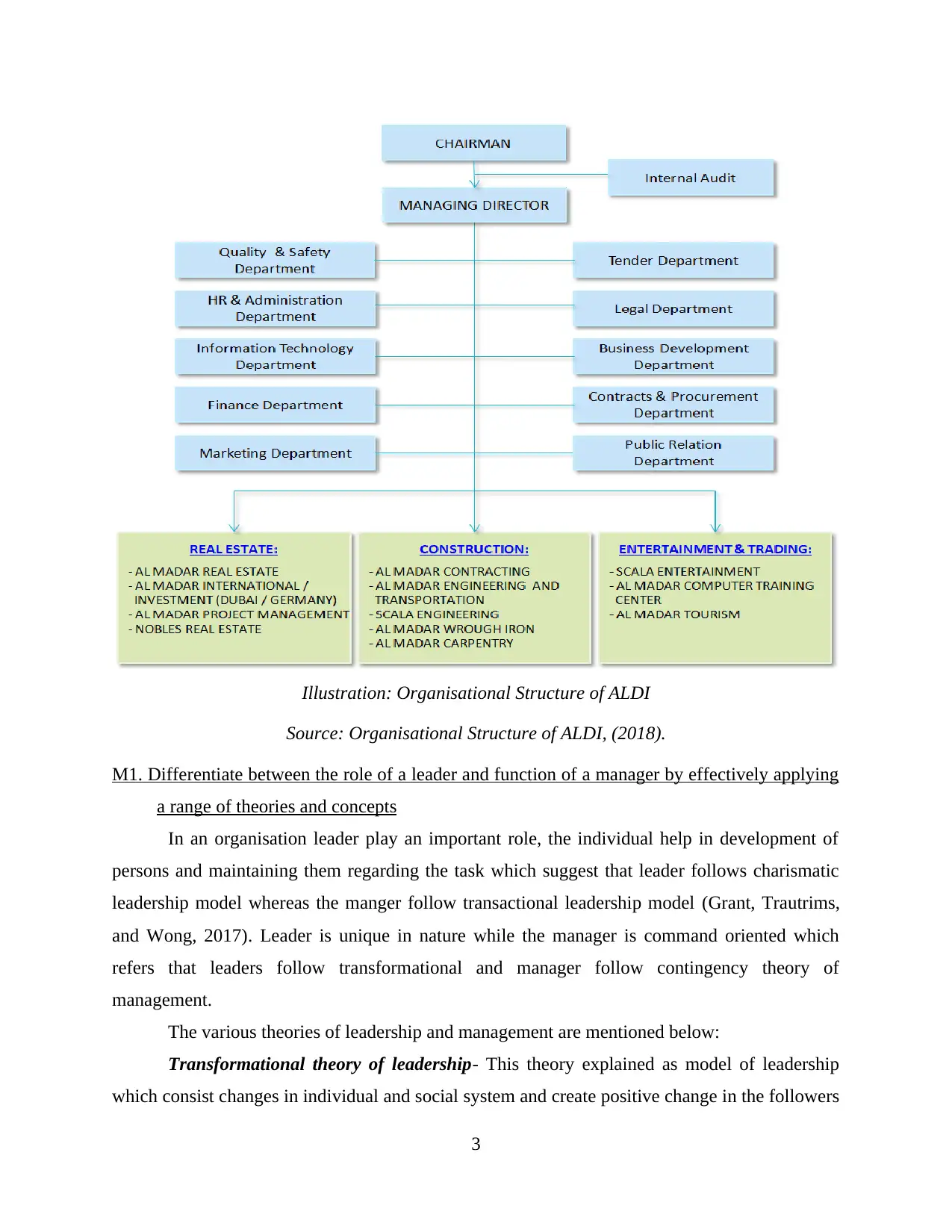
Source: Organisational Structure of ALDI, (2018).
M1. Differentiate between the role of a leader and function of a manager by effectively applying
a range of theories and concepts
In an organisation leader play an important role, the individual help in development of
persons and maintaining them regarding the task which suggest that leader follows charismatic
leadership model whereas the manger follow transactional leadership model (Grant, Trautrims,
and Wong, 2017). Leader is unique in nature while the manager is command oriented which
refers that leaders follow transformational and manager follow contingency theory of
management.
The various theories of leadership and management are mentioned below:
Transformational theory of leadership- This theory explained as model of leadership
which consist changes in individual and social system and create positive change in the followers
3
Illustration: Organisational Structure of ALDI
M1. Differentiate between the role of a leader and function of a manager by effectively applying
a range of theories and concepts
In an organisation leader play an important role, the individual help in development of
persons and maintaining them regarding the task which suggest that leader follows charismatic
leadership model whereas the manger follow transactional leadership model (Grant, Trautrims,
and Wong, 2017). Leader is unique in nature while the manager is command oriented which
refers that leaders follow transformational and manager follow contingency theory of
management.
The various theories of leadership and management are mentioned below:
Transformational theory of leadership- This theory explained as model of leadership
which consist changes in individual and social system and create positive change in the followers
3
Illustration: Organisational Structure of ALDI
⊘ This is a preview!⊘
Do you want full access?
Subscribe today to unlock all pages.

Trusted by 1+ million students worldwide
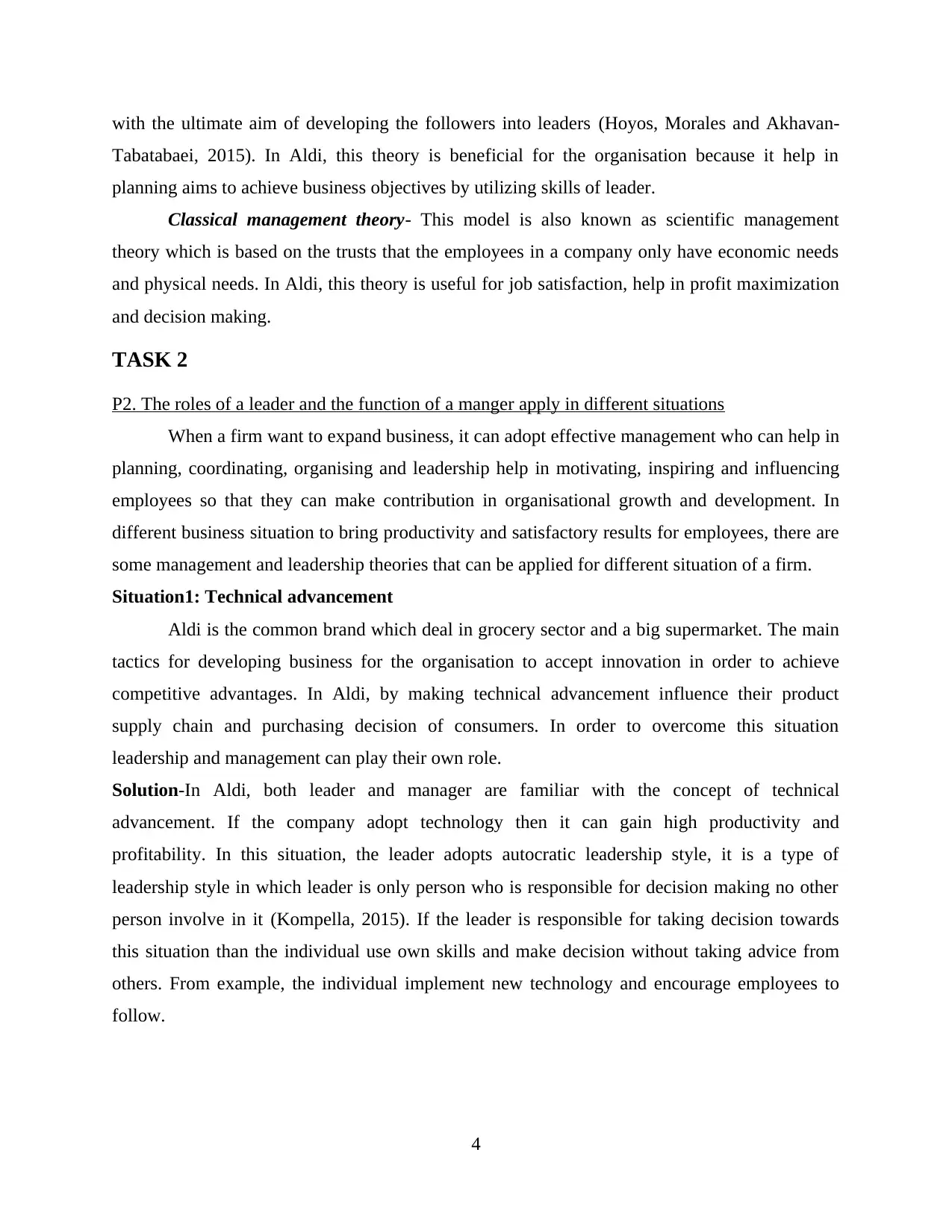
with the ultimate aim of developing the followers into leaders (Hoyos, Morales and Akhavan-
Tabatabaei, 2015). In Aldi, this theory is beneficial for the organisation because it help in
planning aims to achieve business objectives by utilizing skills of leader.
Classical management theory- This model is also known as scientific management
theory which is based on the trusts that the employees in a company only have economic needs
and physical needs. In Aldi, this theory is useful for job satisfaction, help in profit maximization
and decision making.
TASK 2
P2. The roles of a leader and the function of a manger apply in different situations
When a firm want to expand business, it can adopt effective management who can help in
planning, coordinating, organising and leadership help in motivating, inspiring and influencing
employees so that they can make contribution in organisational growth and development. In
different business situation to bring productivity and satisfactory results for employees, there are
some management and leadership theories that can be applied for different situation of a firm.
Situation1: Technical advancement
Aldi is the common brand which deal in grocery sector and a big supermarket. The main
tactics for developing business for the organisation to accept innovation in order to achieve
competitive advantages. In Aldi, by making technical advancement influence their product
supply chain and purchasing decision of consumers. In order to overcome this situation
leadership and management can play their own role.
Solution-In Aldi, both leader and manager are familiar with the concept of technical
advancement. If the company adopt technology then it can gain high productivity and
profitability. In this situation, the leader adopts autocratic leadership style, it is a type of
leadership style in which leader is only person who is responsible for decision making no other
person involve in it (Kompella, 2015). If the leader is responsible for taking decision towards
this situation than the individual use own skills and make decision without taking advice from
others. From example, the individual implement new technology and encourage employees to
follow.
4
Tabatabaei, 2015). In Aldi, this theory is beneficial for the organisation because it help in
planning aims to achieve business objectives by utilizing skills of leader.
Classical management theory- This model is also known as scientific management
theory which is based on the trusts that the employees in a company only have economic needs
and physical needs. In Aldi, this theory is useful for job satisfaction, help in profit maximization
and decision making.
TASK 2
P2. The roles of a leader and the function of a manger apply in different situations
When a firm want to expand business, it can adopt effective management who can help in
planning, coordinating, organising and leadership help in motivating, inspiring and influencing
employees so that they can make contribution in organisational growth and development. In
different business situation to bring productivity and satisfactory results for employees, there are
some management and leadership theories that can be applied for different situation of a firm.
Situation1: Technical advancement
Aldi is the common brand which deal in grocery sector and a big supermarket. The main
tactics for developing business for the organisation to accept innovation in order to achieve
competitive advantages. In Aldi, by making technical advancement influence their product
supply chain and purchasing decision of consumers. In order to overcome this situation
leadership and management can play their own role.
Solution-In Aldi, both leader and manager are familiar with the concept of technical
advancement. If the company adopt technology then it can gain high productivity and
profitability. In this situation, the leader adopts autocratic leadership style, it is a type of
leadership style in which leader is only person who is responsible for decision making no other
person involve in it (Kompella, 2015). If the leader is responsible for taking decision towards
this situation than the individual use own skills and make decision without taking advice from
others. From example, the individual implement new technology and encourage employees to
follow.
4
Paraphrase This Document
Need a fresh take? Get an instant paraphrase of this document with our AI Paraphraser
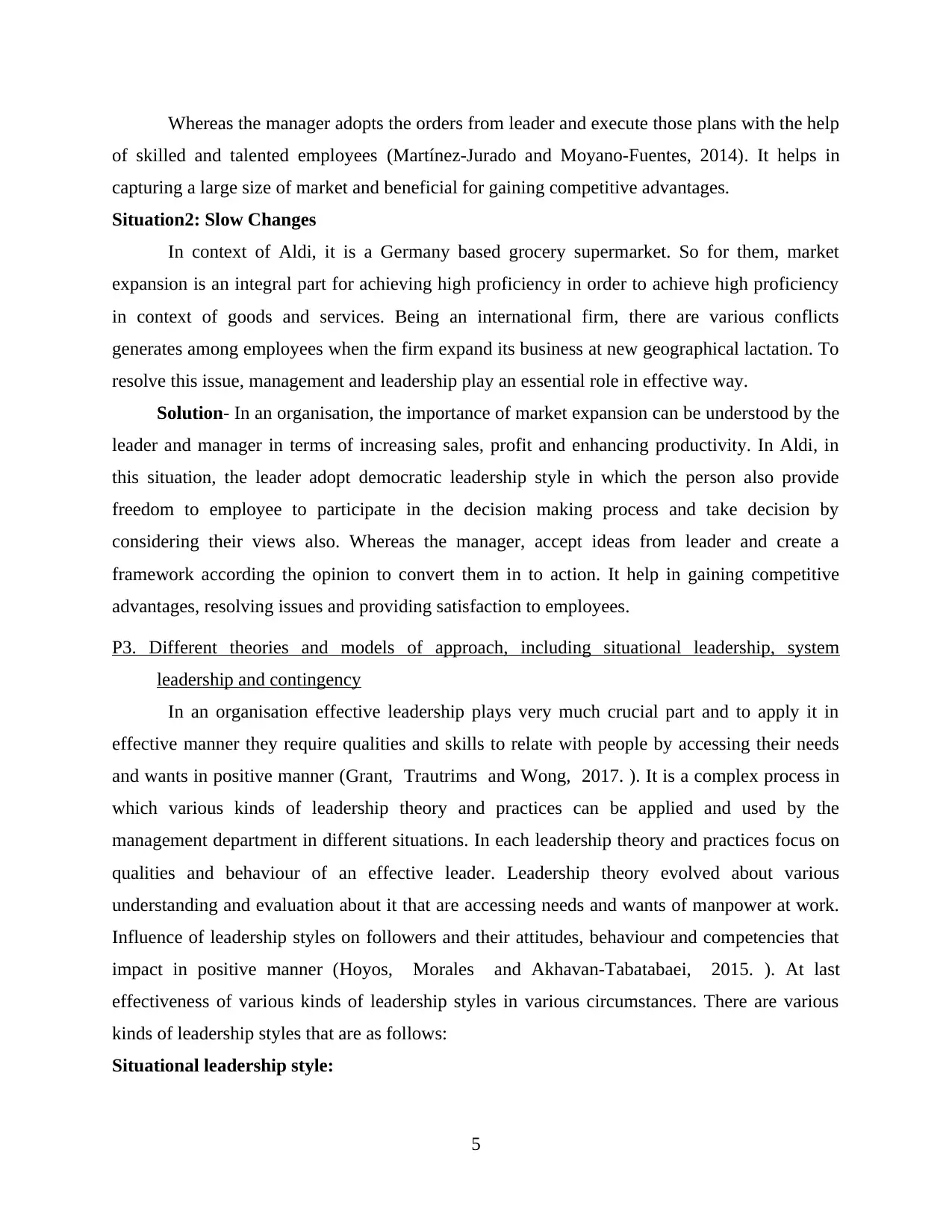
Whereas the manager adopts the orders from leader and execute those plans with the help
of skilled and talented employees (Martínez-Jurado and Moyano-Fuentes, 2014). It helps in
capturing a large size of market and beneficial for gaining competitive advantages.
Situation2: Slow Changes
In context of Aldi, it is a Germany based grocery supermarket. So for them, market
expansion is an integral part for achieving high proficiency in order to achieve high proficiency
in context of goods and services. Being an international firm, there are various conflicts
generates among employees when the firm expand its business at new geographical lactation. To
resolve this issue, management and leadership play an essential role in effective way.
Solution- In an organisation, the importance of market expansion can be understood by the
leader and manager in terms of increasing sales, profit and enhancing productivity. In Aldi, in
this situation, the leader adopt democratic leadership style in which the person also provide
freedom to employee to participate in the decision making process and take decision by
considering their views also. Whereas the manager, accept ideas from leader and create a
framework according the opinion to convert them in to action. It help in gaining competitive
advantages, resolving issues and providing satisfaction to employees.
P3. Different theories and models of approach, including situational leadership, system
leadership and contingency
In an organisation effective leadership plays very much crucial part and to apply it in
effective manner they require qualities and skills to relate with people by accessing their needs
and wants in positive manner (Grant, Trautrims and Wong, 2017. ). It is a complex process in
which various kinds of leadership theory and practices can be applied and used by the
management department in different situations. In each leadership theory and practices focus on
qualities and behaviour of an effective leader. Leadership theory evolved about various
understanding and evaluation about it that are accessing needs and wants of manpower at work.
Influence of leadership styles on followers and their attitudes, behaviour and competencies that
impact in positive manner (Hoyos, Morales and Akhavan-Tabatabaei, 2015. ). At last
effectiveness of various kinds of leadership styles in various circumstances. There are various
kinds of leadership styles that are as follows:
Situational leadership style:
5
of skilled and talented employees (Martínez-Jurado and Moyano-Fuentes, 2014). It helps in
capturing a large size of market and beneficial for gaining competitive advantages.
Situation2: Slow Changes
In context of Aldi, it is a Germany based grocery supermarket. So for them, market
expansion is an integral part for achieving high proficiency in order to achieve high proficiency
in context of goods and services. Being an international firm, there are various conflicts
generates among employees when the firm expand its business at new geographical lactation. To
resolve this issue, management and leadership play an essential role in effective way.
Solution- In an organisation, the importance of market expansion can be understood by the
leader and manager in terms of increasing sales, profit and enhancing productivity. In Aldi, in
this situation, the leader adopt democratic leadership style in which the person also provide
freedom to employee to participate in the decision making process and take decision by
considering their views also. Whereas the manager, accept ideas from leader and create a
framework according the opinion to convert them in to action. It help in gaining competitive
advantages, resolving issues and providing satisfaction to employees.
P3. Different theories and models of approach, including situational leadership, system
leadership and contingency
In an organisation effective leadership plays very much crucial part and to apply it in
effective manner they require qualities and skills to relate with people by accessing their needs
and wants in positive manner (Grant, Trautrims and Wong, 2017. ). It is a complex process in
which various kinds of leadership theory and practices can be applied and used by the
management department in different situations. In each leadership theory and practices focus on
qualities and behaviour of an effective leader. Leadership theory evolved about various
understanding and evaluation about it that are accessing needs and wants of manpower at work.
Influence of leadership styles on followers and their attitudes, behaviour and competencies that
impact in positive manner (Hoyos, Morales and Akhavan-Tabatabaei, 2015. ). At last
effectiveness of various kinds of leadership styles in various circumstances. There are various
kinds of leadership styles that are as follows:
Situational leadership style:
5
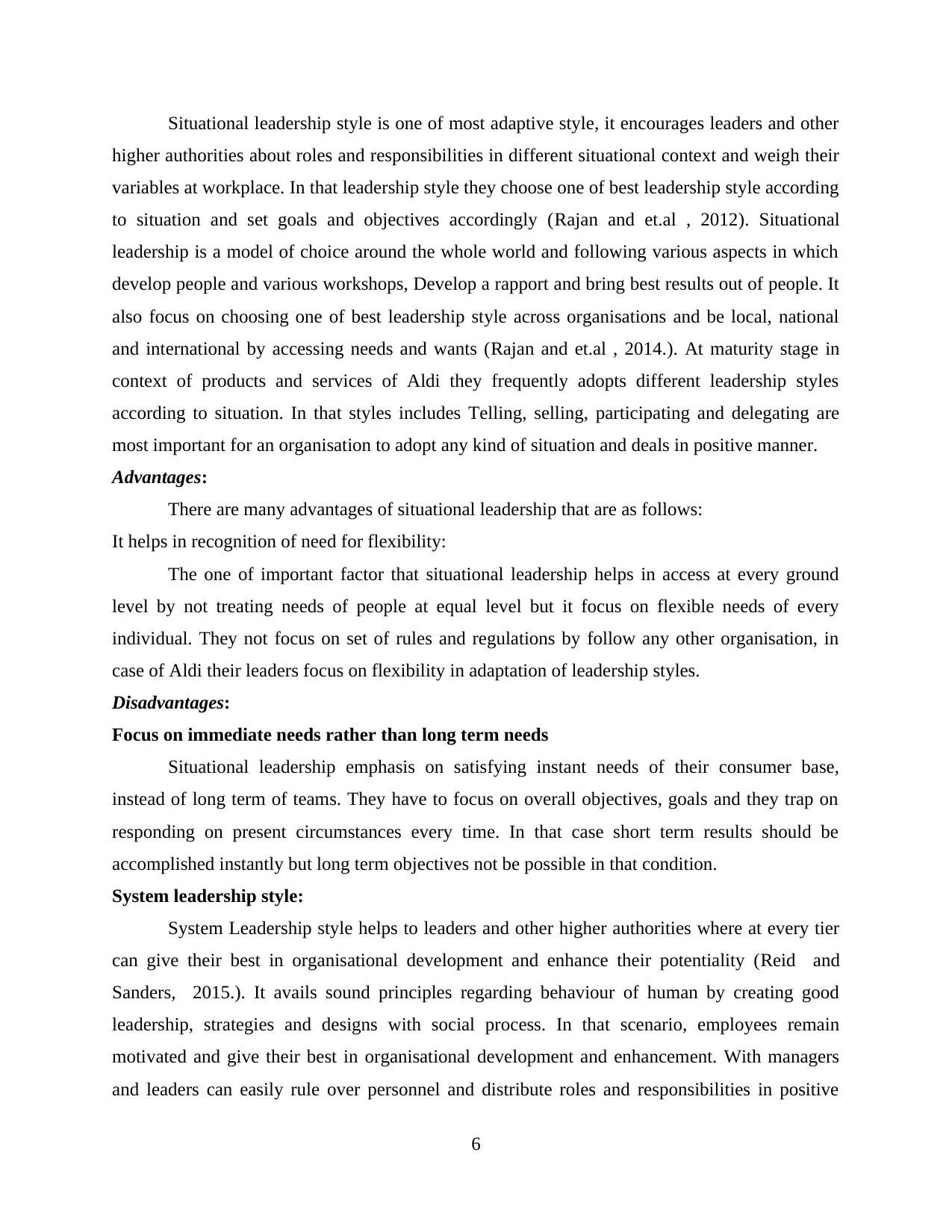
Situational leadership style is one of most adaptive style, it encourages leaders and other
higher authorities about roles and responsibilities in different situational context and weigh their
variables at workplace. In that leadership style they choose one of best leadership style according
to situation and set goals and objectives accordingly (Rajan and et.al , 2012). Situational
leadership is a model of choice around the whole world and following various aspects in which
develop people and various workshops, Develop a rapport and bring best results out of people. It
also focus on choosing one of best leadership style across organisations and be local, national
and international by accessing needs and wants (Rajan and et.al , 2014.). At maturity stage in
context of products and services of Aldi they frequently adopts different leadership styles
according to situation. In that styles includes Telling, selling, participating and delegating are
most important for an organisation to adopt any kind of situation and deals in positive manner.
Advantages:
There are many advantages of situational leadership that are as follows:
It helps in recognition of need for flexibility:
The one of important factor that situational leadership helps in access at every ground
level by not treating needs of people at equal level but it focus on flexible needs of every
individual. They not focus on set of rules and regulations by follow any other organisation, in
case of Aldi their leaders focus on flexibility in adaptation of leadership styles.
Disadvantages:
Focus on immediate needs rather than long term needs
Situational leadership emphasis on satisfying instant needs of their consumer base,
instead of long term of teams. They have to focus on overall objectives, goals and they trap on
responding on present circumstances every time. In that case short term results should be
accomplished instantly but long term objectives not be possible in that condition.
System leadership style:
System Leadership style helps to leaders and other higher authorities where at every tier
can give their best in organisational development and enhance their potentiality (Reid and
Sanders, 2015.). It avails sound principles regarding behaviour of human by creating good
leadership, strategies and designs with social process. In that scenario, employees remain
motivated and give their best in organisational development and enhancement. With managers
and leaders can easily rule over personnel and distribute roles and responsibilities in positive
6
higher authorities about roles and responsibilities in different situational context and weigh their
variables at workplace. In that leadership style they choose one of best leadership style according
to situation and set goals and objectives accordingly (Rajan and et.al , 2012). Situational
leadership is a model of choice around the whole world and following various aspects in which
develop people and various workshops, Develop a rapport and bring best results out of people. It
also focus on choosing one of best leadership style across organisations and be local, national
and international by accessing needs and wants (Rajan and et.al , 2014.). At maturity stage in
context of products and services of Aldi they frequently adopts different leadership styles
according to situation. In that styles includes Telling, selling, participating and delegating are
most important for an organisation to adopt any kind of situation and deals in positive manner.
Advantages:
There are many advantages of situational leadership that are as follows:
It helps in recognition of need for flexibility:
The one of important factor that situational leadership helps in access at every ground
level by not treating needs of people at equal level but it focus on flexible needs of every
individual. They not focus on set of rules and regulations by follow any other organisation, in
case of Aldi their leaders focus on flexibility in adaptation of leadership styles.
Disadvantages:
Focus on immediate needs rather than long term needs
Situational leadership emphasis on satisfying instant needs of their consumer base,
instead of long term of teams. They have to focus on overall objectives, goals and they trap on
responding on present circumstances every time. In that case short term results should be
accomplished instantly but long term objectives not be possible in that condition.
System leadership style:
System Leadership style helps to leaders and other higher authorities where at every tier
can give their best in organisational development and enhance their potentiality (Reid and
Sanders, 2015.). It avails sound principles regarding behaviour of human by creating good
leadership, strategies and designs with social process. In that scenario, employees remain
motivated and give their best in organisational development and enhancement. With managers
and leaders can easily rule over personnel and distribute roles and responsibilities in positive
6
⊘ This is a preview!⊘
Do you want full access?
Subscribe today to unlock all pages.

Trusted by 1+ million students worldwide
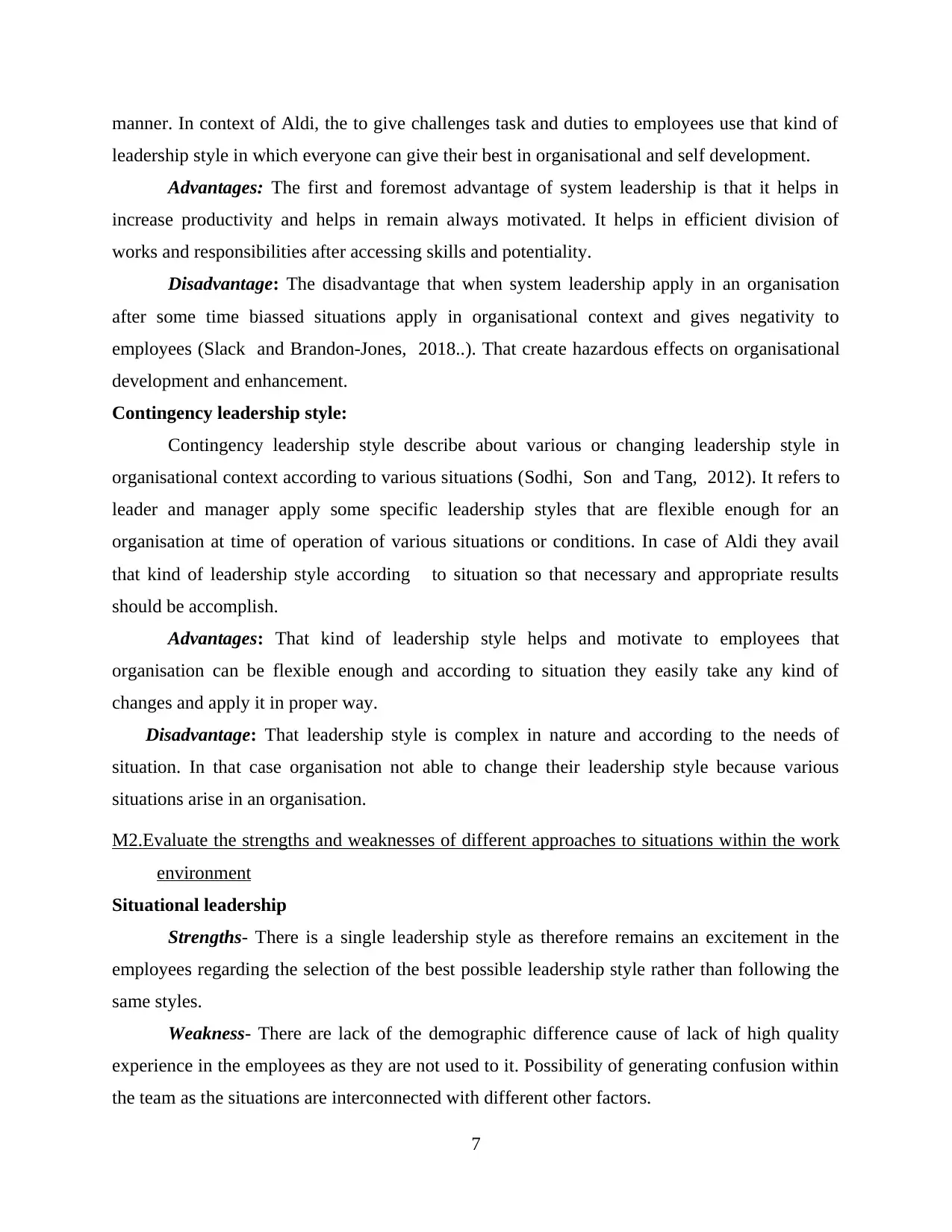
manner. In context of Aldi, the to give challenges task and duties to employees use that kind of
leadership style in which everyone can give their best in organisational and self development.
Advantages: The first and foremost advantage of system leadership is that it helps in
increase productivity and helps in remain always motivated. It helps in efficient division of
works and responsibilities after accessing skills and potentiality.
Disadvantage: The disadvantage that when system leadership apply in an organisation
after some time biassed situations apply in organisational context and gives negativity to
employees (Slack and Brandon-Jones, 2018..). That create hazardous effects on organisational
development and enhancement.
Contingency leadership style:
Contingency leadership style describe about various or changing leadership style in
organisational context according to various situations (Sodhi, Son and Tang, 2012). It refers to
leader and manager apply some specific leadership styles that are flexible enough for an
organisation at time of operation of various situations or conditions. In case of Aldi they avail
that kind of leadership style according to situation so that necessary and appropriate results
should be accomplish.
Advantages: That kind of leadership style helps and motivate to employees that
organisation can be flexible enough and according to situation they easily take any kind of
changes and apply it in proper way.
Disadvantage: That leadership style is complex in nature and according to the needs of
situation. In that case organisation not able to change their leadership style because various
situations arise in an organisation.
M2.Evaluate the strengths and weaknesses of different approaches to situations within the work
environment
Situational leadership
Strengths- There is a single leadership style as therefore remains an excitement in the
employees regarding the selection of the best possible leadership style rather than following the
same styles.
Weakness- There are lack of the demographic difference cause of lack of high quality
experience in the employees as they are not used to it. Possibility of generating confusion within
the team as the situations are interconnected with different other factors.
7
leadership style in which everyone can give their best in organisational and self development.
Advantages: The first and foremost advantage of system leadership is that it helps in
increase productivity and helps in remain always motivated. It helps in efficient division of
works and responsibilities after accessing skills and potentiality.
Disadvantage: The disadvantage that when system leadership apply in an organisation
after some time biassed situations apply in organisational context and gives negativity to
employees (Slack and Brandon-Jones, 2018..). That create hazardous effects on organisational
development and enhancement.
Contingency leadership style:
Contingency leadership style describe about various or changing leadership style in
organisational context according to various situations (Sodhi, Son and Tang, 2012). It refers to
leader and manager apply some specific leadership styles that are flexible enough for an
organisation at time of operation of various situations or conditions. In case of Aldi they avail
that kind of leadership style according to situation so that necessary and appropriate results
should be accomplish.
Advantages: That kind of leadership style helps and motivate to employees that
organisation can be flexible enough and according to situation they easily take any kind of
changes and apply it in proper way.
Disadvantage: That leadership style is complex in nature and according to the needs of
situation. In that case organisation not able to change their leadership style because various
situations arise in an organisation.
M2.Evaluate the strengths and weaknesses of different approaches to situations within the work
environment
Situational leadership
Strengths- There is a single leadership style as therefore remains an excitement in the
employees regarding the selection of the best possible leadership style rather than following the
same styles.
Weakness- There are lack of the demographic difference cause of lack of high quality
experience in the employees as they are not used to it. Possibility of generating confusion within
the team as the situations are interconnected with different other factors.
7
Paraphrase This Document
Need a fresh take? Get an instant paraphrase of this document with our AI Paraphraser
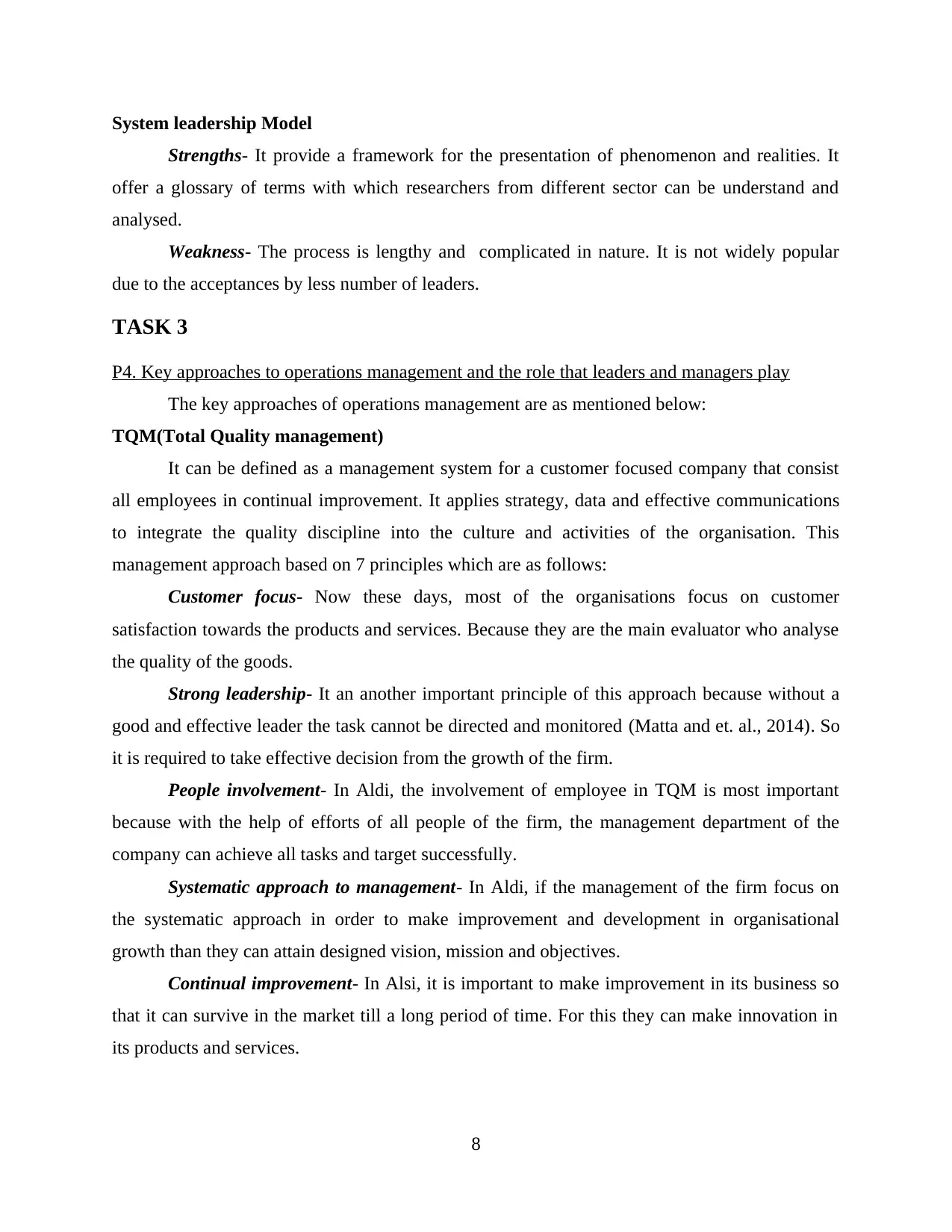
System leadership Model
Strengths- It provide a framework for the presentation of phenomenon and realities. It
offer a glossary of terms with which researchers from different sector can be understand and
analysed.
Weakness- The process is lengthy and complicated in nature. It is not widely popular
due to the acceptances by less number of leaders.
TASK 3
P4. Key approaches to operations management and the role that leaders and managers play
The key approaches of operations management are as mentioned below:
TQM(Total Quality management)
It can be defined as a management system for a customer focused company that consist
all employees in continual improvement. It applies strategy, data and effective communications
to integrate the quality discipline into the culture and activities of the organisation. This
management approach based on 7 principles which are as follows:
Customer focus- Now these days, most of the organisations focus on customer
satisfaction towards the products and services. Because they are the main evaluator who analyse
the quality of the goods.
Strong leadership- It an another important principle of this approach because without a
good and effective leader the task cannot be directed and monitored (Matta and et. al., 2014). So
it is required to take effective decision from the growth of the firm.
People involvement- In Aldi, the involvement of employee in TQM is most important
because with the help of efforts of all people of the firm, the management department of the
company can achieve all tasks and target successfully.
Systematic approach to management- In Aldi, if the management of the firm focus on
the systematic approach in order to make improvement and development in organisational
growth than they can attain designed vision, mission and objectives.
Continual improvement- In Alsi, it is important to make improvement in its business so
that it can survive in the market till a long period of time. For this they can make innovation in
its products and services.
8
Strengths- It provide a framework for the presentation of phenomenon and realities. It
offer a glossary of terms with which researchers from different sector can be understand and
analysed.
Weakness- The process is lengthy and complicated in nature. It is not widely popular
due to the acceptances by less number of leaders.
TASK 3
P4. Key approaches to operations management and the role that leaders and managers play
The key approaches of operations management are as mentioned below:
TQM(Total Quality management)
It can be defined as a management system for a customer focused company that consist
all employees in continual improvement. It applies strategy, data and effective communications
to integrate the quality discipline into the culture and activities of the organisation. This
management approach based on 7 principles which are as follows:
Customer focus- Now these days, most of the organisations focus on customer
satisfaction towards the products and services. Because they are the main evaluator who analyse
the quality of the goods.
Strong leadership- It an another important principle of this approach because without a
good and effective leader the task cannot be directed and monitored (Matta and et. al., 2014). So
it is required to take effective decision from the growth of the firm.
People involvement- In Aldi, the involvement of employee in TQM is most important
because with the help of efforts of all people of the firm, the management department of the
company can achieve all tasks and target successfully.
Systematic approach to management- In Aldi, if the management of the firm focus on
the systematic approach in order to make improvement and development in organisational
growth than they can attain designed vision, mission and objectives.
Continual improvement- In Alsi, it is important to make improvement in its business so
that it can survive in the market till a long period of time. For this they can make innovation in
its products and services.
8
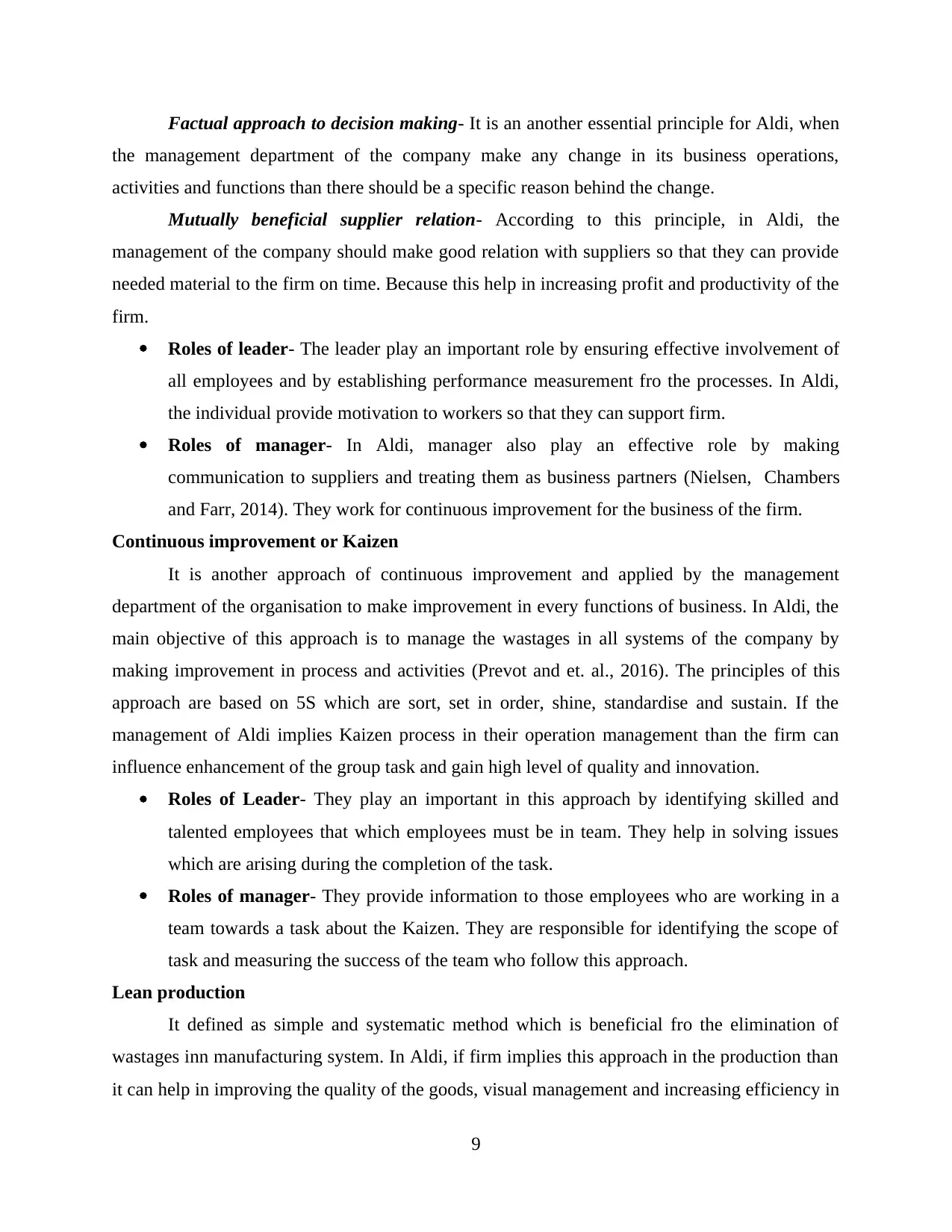
Factual approach to decision making- It is an another essential principle for Aldi, when
the management department of the company make any change in its business operations,
activities and functions than there should be a specific reason behind the change.
Mutually beneficial supplier relation- According to this principle, in Aldi, the
management of the company should make good relation with suppliers so that they can provide
needed material to the firm on time. Because this help in increasing profit and productivity of the
firm.
Roles of leader- The leader play an important role by ensuring effective involvement of
all employees and by establishing performance measurement fro the processes. In Aldi,
the individual provide motivation to workers so that they can support firm.
Roles of manager- In Aldi, manager also play an effective role by making
communication to suppliers and treating them as business partners (Nielsen, Chambers
and Farr, 2014). They work for continuous improvement for the business of the firm.
Continuous improvement or Kaizen
It is another approach of continuous improvement and applied by the management
department of the organisation to make improvement in every functions of business. In Aldi, the
main objective of this approach is to manage the wastages in all systems of the company by
making improvement in process and activities (Prevot and et. al., 2016). The principles of this
approach are based on 5S which are sort, set in order, shine, standardise and sustain. If the
management of Aldi implies Kaizen process in their operation management than the firm can
influence enhancement of the group task and gain high level of quality and innovation.
Roles of Leader- They play an important in this approach by identifying skilled and
talented employees that which employees must be in team. They help in solving issues
which are arising during the completion of the task.
Roles of manager- They provide information to those employees who are working in a
team towards a task about the Kaizen. They are responsible for identifying the scope of
task and measuring the success of the team who follow this approach.
Lean production
It defined as simple and systematic method which is beneficial fro the elimination of
wastages inn manufacturing system. In Aldi, if firm implies this approach in the production than
it can help in improving the quality of the goods, visual management and increasing efficiency in
9
the management department of the company make any change in its business operations,
activities and functions than there should be a specific reason behind the change.
Mutually beneficial supplier relation- According to this principle, in Aldi, the
management of the company should make good relation with suppliers so that they can provide
needed material to the firm on time. Because this help in increasing profit and productivity of the
firm.
Roles of leader- The leader play an important role by ensuring effective involvement of
all employees and by establishing performance measurement fro the processes. In Aldi,
the individual provide motivation to workers so that they can support firm.
Roles of manager- In Aldi, manager also play an effective role by making
communication to suppliers and treating them as business partners (Nielsen, Chambers
and Farr, 2014). They work for continuous improvement for the business of the firm.
Continuous improvement or Kaizen
It is another approach of continuous improvement and applied by the management
department of the organisation to make improvement in every functions of business. In Aldi, the
main objective of this approach is to manage the wastages in all systems of the company by
making improvement in process and activities (Prevot and et. al., 2016). The principles of this
approach are based on 5S which are sort, set in order, shine, standardise and sustain. If the
management of Aldi implies Kaizen process in their operation management than the firm can
influence enhancement of the group task and gain high level of quality and innovation.
Roles of Leader- They play an important in this approach by identifying skilled and
talented employees that which employees must be in team. They help in solving issues
which are arising during the completion of the task.
Roles of manager- They provide information to those employees who are working in a
team towards a task about the Kaizen. They are responsible for identifying the scope of
task and measuring the success of the team who follow this approach.
Lean production
It defined as simple and systematic method which is beneficial fro the elimination of
wastages inn manufacturing system. In Aldi, if firm implies this approach in the production than
it can help in improving the quality of the goods, visual management and increasing efficiency in
9
⊘ This is a preview!⊘
Do you want full access?
Subscribe today to unlock all pages.

Trusted by 1+ million students worldwide
1 out of 17
Related Documents
Your All-in-One AI-Powered Toolkit for Academic Success.
+13062052269
info@desklib.com
Available 24*7 on WhatsApp / Email
![[object Object]](/_next/static/media/star-bottom.7253800d.svg)
Unlock your academic potential
Copyright © 2020–2026 A2Z Services. All Rights Reserved. Developed and managed by ZUCOL.





